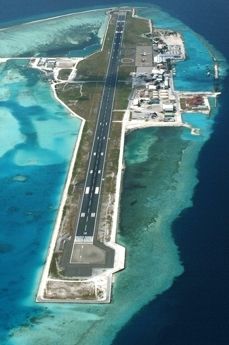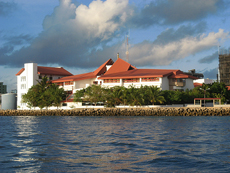With additional reporting by Lucy Lovell
The Maldives should take precautionary steps to ensure that it does not become a hub for people smuggling, Minister of Defence and National Security Mohamed Nazim said on Sunday.
“This smuggling of people is done by garnering a lot of financial aid. People smuggling has become a huge business globally.”
“We must do all necessary to inhibit people smuggling through the Maldives,” said the minister.
Despite the recent introduction of legislation to address the country’s longstanding problems with human trafficking, doubts persist over implementation, as well as the law’s capacity to prosecute human smuggling – different to trafficking in that individuals give a measure of consent to be transported illegally.
Speaking at the inauguration of a workshop titled ‘Capacity Building for Front line Investigation and Border Control Officers to Combat People Smuggling’ – which started in Kurumba Island Resort on Sunday – Nazim spoke of the important role that can be played by immigration and police officers to prevent people smuggling.
He further stated that the immigration cell established at the Immigration Department needs to further develop and function more strongly in the future.
“We in the Maldives do not want anyone to use our borders to illegally cross into other countries. Even quite recently, we came across some Syrians who used the Maldives as an intermediary to travel onto another country.”
“We must ensure that the Maldivian border is one which is safe and protected, and that people are aware of this security,” added Nazim during the event organised by the International Organisation for Migration, and the Department of Immigration and Emigration.
Smuggling concerns
The defence minister – also in charge of the immigration department – announced plans to apprehend and deport all undocumented foreign workers from the capital Malé within four months.
Local NGO Transparency Maldives recently estimated that the number of migrant workers in the country could number as many as 200,000 – a figure that amounts to two thirds of the country’s population.
The Maldives’ first anti trafficking legislation was ratified by President Abdulla Yameen in December last year, receiving a mixed responses from the Human Rights Commission Maldives (HRCM).
Assistant Controller Ali Ashraf from the HRCM described the new legislation at the time as “an excellent piece of work”, though he noted that the failure to include the category of smuggling in the act made it very likely that offenders would be able to evade prosecution.
“The definition of trafficking can be twisted so easily,” warned Ashraf.
The HRCM has also raised the issue of Syrian refugees – mentioned by the defence minister today – using the Maldives as a transit point back in November 2013.
A leaked document from the immigration department, obtained by Minivan News last year, that the Maldives status as a tourist hub granting free visas upon arrival to over one million tourists a year, made it increasingly attractive as a transit destination
Previous case studies on several refugees appeared to reveal inconsistencies with the immigration department’s decisions, with similar refugee cases receiving different verdicts from Maldivian authorities.
HRCM member Jeehan Mahmood argued that the government’s inconsistencies resulted in discriminatory practices inappropriate to a country aspiring to uphold its human rights obligations.
 On December 8, the Transport and Communication Ministry revealed that it would finish drafting plans and begin the groundwork within a 100 days to develop the Ibrahim Nasir International Airport (INIA) to be able to cater to 5 million passengers.
On December 8, the Transport and Communication Ministry revealed that it would finish drafting plans and begin the groundwork within a 100 days to develop the Ibrahim Nasir International Airport (INIA) to be able to cater to 5 million passengers. held today that the government was drafting a policy to “bring major development to IGMH in a very short period of time to an extent never before seen”.
held today that the government was drafting a policy to “bring major development to IGMH in a very short period of time to an extent never before seen”. Maldives National Defence Force (MNDF)’s 100 day strategic plan includes the submission of various amendments to relevant laws – including the Armed Forces Act and Narional Security Act – to the parliament, and the establishment of a ‘justice system’ within the force.
Maldives National Defence Force (MNDF)’s 100 day strategic plan includes the submission of various amendments to relevant laws – including the Armed Forces Act and Narional Security Act – to the parliament, and the establishment of a ‘justice system’ within the force.